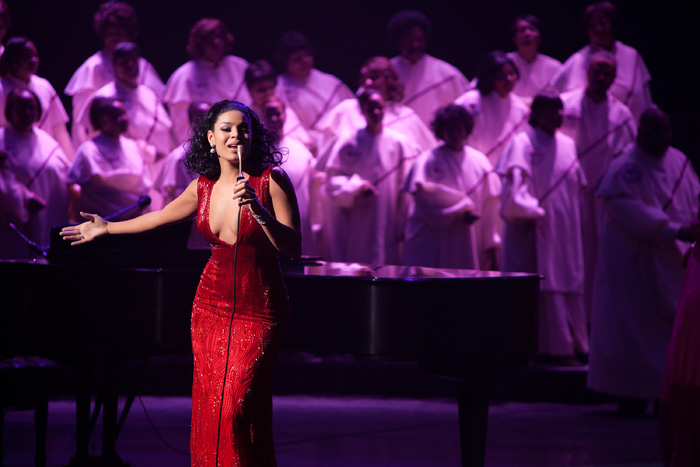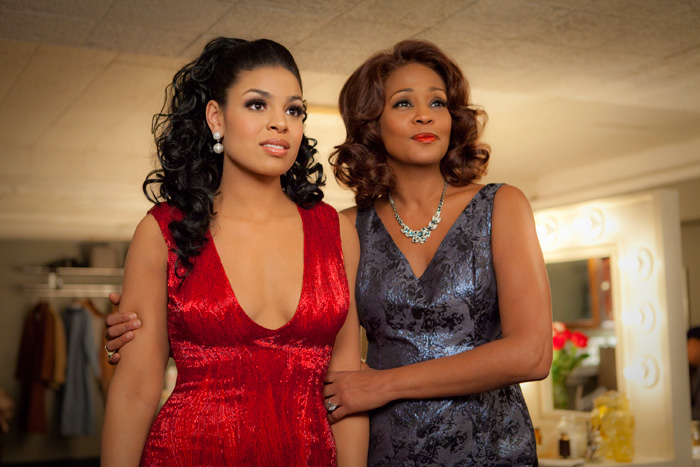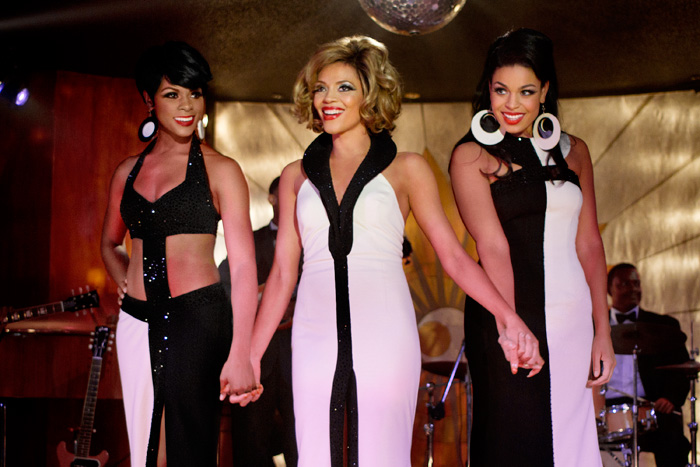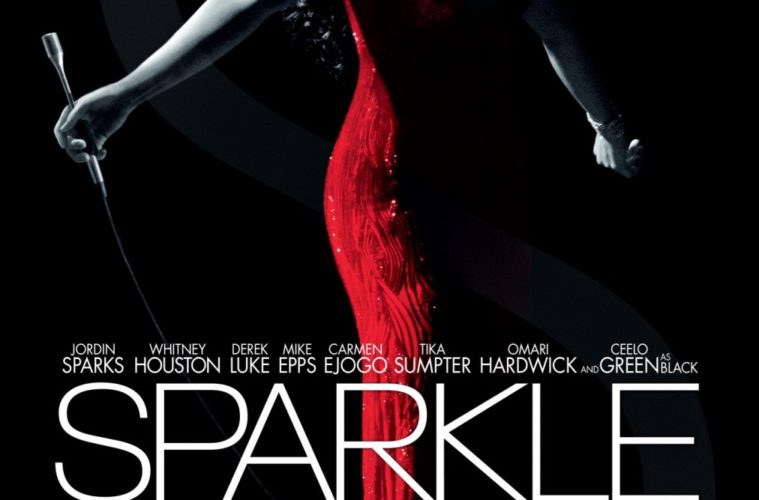I can’t wait for the Director’s Cut. No, not Criterion’s much ballyhooed 216-minute edit of Michael Cimino‘s Heaven’s Gate. I’m talking about Salim Akil‘s Sparkle. I need to try and piece together the gaps leading towards its imploded Motown trio’s back-up singer earning a sold out first ever solo show with full orchestra and gospel choir after barely receiving two minutes of unsolicited time from the record executive who already dropped her once. I don’t care if her voice is like listening to Jesus sing from the heavens—no amount of dreaming is landing you on that stage with that accompaniment with little more than a thrown together expository instance of her manager saying, “Didn’t I tell ya?” to the now thrilled theater owner taking a chance on an unproven talent. Not going to happen.

But this is par for the course as events escalate to their extremes—good or bad—without warning in this update of the 1976 Supremes-inspired film of the same name. Originally in the works as a vehicle for the late Aaliyah a decade ago via Whitney Houston‘s production shingle, the movie that so enraptured her as a teen to use her gift of music has now become the singer’s swan song onscreen. Changed from a down-on-their-luck family in 1950s Harlem to a religiously affluent conservative contingent in Detroit during the Civil Rights movement and Motown’s ascendancy to music superiority, Sparkle retains its dream fulfillment quest for its namesake character at the demise of those around her while skewed messages of love condone the short-sighted actions of a mother who only feels pride in her children if they listen and do exactly what she says.
It’s a trope we’ve already seen at least twice this past year with the Footloose remake and Joyful Noise and Houston’s portrayal of Emma does nothing to stand apart from Dennis Quaid or Queen Latifah. A thinly written role allowing her to purse her lips and glare down any who would dare question her authority, the only real worth comes from the tragic fall from superstardom that has her sheltering daughters with the same ability to shine in the spotlight. You can’t help but see the comparison between not only Emma’s missteps but also eldest child Sister’s (Carmen Ejogo) eventual descent into the hell of sex and drugs so intrinsically bound to the life of a performer. The cautionary moments depicted are exactly what derailed Houston’s own life and career, so if nothing else you must applaud her for trying to prevent those aspiring in her footsteps from finding the same fate.

Unfortunately, Sparkle becomes little more than an overwrought After School Special of “I told you sos” and clarity discovered only after inescapable tragedy hits. And it started so good with audience point of view shooting inside a packed club as Big Black (Cee-lo Green) kills it on stage. We writhe with the crowd, feel the sweat drip, and really get thrown into the atmospheric power of music evolving. We meet Sparkle (“American Idol” winner and aptly named Jordin Sparks) as she pleads for Sister to sing her song with the sexuality only she possesses; the recently-arrived hopeful band manager Stix (Derek Luke) scopes out new talent; and the people let the sound wash over them. Raw, energetic, and aesthetically gorgeous, nothing occurring after we leave this bar comes close to its promise.
Stix recruits Sparkle’s songwriting genius, Sister’s charisma, and middle sister Dee’s (Tika Sumpter) headstrong attitude to form Sister and Her Sisters and the world is theirs. It should be a rudimentarily montaged ascent sprawling into internal strife, hiccups, and eventual happy endings, but instead becomes a steady stream of out-of-the-blue insanity. It isn’t enough to give these girls conflict; they need to be battered into submission before moving on through prison, school, fame, or acceptance. Characters come and go when screenwriter Mara Brock Akil pleases with hamfisted dialogue like our main love interests saying each other’s names every line during what should be a massively emotional moment when no one else is around. The pacing is disjointed, success is unearned in the scope of what’s shown, and we find we could care less about anyone onscreen.

I know it’s a dream come true type tale and I should just go with the fact someone who never sang a song by herself on stage can get diva treatment for no other reason than giving the film its inevitably stirring finale, but the fact so many other scenes plead for authenticity won’t allow it. A dinner scene pitting Houston’s Emma—her best moment of pure vitriol—and Reverend Bryce (Michael Beach) against the brash smarm of sellout comedian Satin (Mike Epps) pulls no punches as far as religion, racial slurs, or unchecked aggression. If only the rest of the film could equal the gravity of the drama seen here. The stakes are rarely real and misguided directorial flourishes like a slomotion exterior pan of spousal abuse through an apartment’s windows recalling the opening to Watchmen do nothing to stop the unintentional comedy.
There are some standout performances, though, as Sumpter shines before her idealism is neutered, Ejogo steals attention through sensuality, and Sparks works at the center considering it’s her first acting role—each rousingly singing Curtis Mayfield‘s songs through an R. Kelly filter. Epps demands mention for a much darker part than we’re used to and is overshadowed only by the small but integral Omari Hardwick. The sole authentic character of the bunch, Hardwick’s Levi depicts the collateral damage of innocence ripped away by celebrity. He is relatable, pitiable, and enviable by the end as revenge is had through nuance and subtlety—something the rest of Sparkle is sorely lacking. While we’re constantly hit over the head by the sisters’ journey, we’re reminded of humanity through Hardwick alone. His success making everything else that much more disappointing.
Sparkle hits theaters Friday, August 17th.

